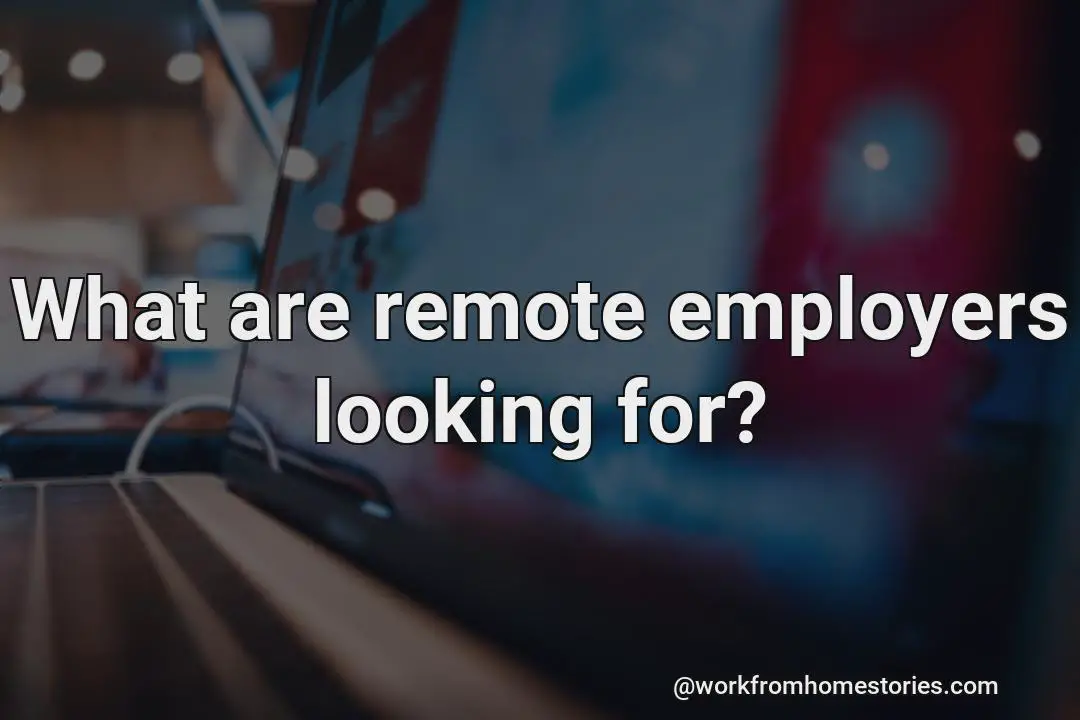What are remote employers looking for?

To work remotely employers look for people with technical skills and the ability to manage and troubleshoot equipment issues. Remote workers rely on technology to interact and conduct operations so having an independently handled issue is important. The average salary for a remote worker is around $50,000 per year, and the average job tenure is around three years. There is a large demand for remote workers, so many companies are hiring for positions that are traditionally filled with onsite workers. Remote workers can expect to earn roughly the same amount as their in-office co-workers.
The key to a successful remote worker is to make sure that the candidate has the right set of technical skills. For example, employees who have experience with data center management and networking can leverage their skills to work remotely.
The Future of Work
The future of
What should you look for in a fully remote position?
Along the same lines discipline are necessary time management skills. A good remote worker is able to organize their day and complete their work when it is due. Although it’s easier to schedule appointments and other activities into your day being sure to meet expectations and complete work is a must. While the above attributes are a must for any remote worker, they are only a small portion of the skill set needed to be a great remote worker. There are many other attributes that are needed in order to be a great remote worker.
Communication Skills
Communication skills are key to any remote worker. It is important to be able to communicate with your client at all times. A great remote worker will be able to communicate effectively with their client through text, email, and phone. It is important to be able to communicate clearly and effectively to ensure that your client is getting what they need from you.
What employers are looking for in a remote employee?
Ideally remote employees should have intrinsically motivated employees who operate with a high degree of productivity and professionalism. This includes prompt and productive communication that is detail-oriented and focused on problem-solving and achieving results. 3. Flexibility
Remote employees are highly flexible, as they are not bound to a specific location. They can work from anywhere, at any time, and their work can also be completed at their convenience. These are individuals who have the ability to work remotely without having to sacrifice the quality of their work.
4. Communication Skills
Remote employees are required to have good communication skills, as they will be talking to other people, including clients and co-workers. However, the most important skill to have as a remote employee is communication with management.
5. Work Ethic
Remote employees have
What do employers value the most?
Employers responding to nace’s job outlook surveys have consistently indicated that critical thinkingproblem solving teamwork - work ethic and oralwritten communications are all essential competencies. The NACE’s Job Outlook 2010 report was released in March 2010 and it shows that the job outlook for 2010 is much more positive than it was in 2009. It looks like the recovery is here and employers are looking for candidates that have the skills needed to get the job done.
With unemployment still high in many industries, it’s important for employers to understand the type of skills that are needed to fill positions. The NACE Job Outlook 2010 report is the leading source of information for employers seeking to hire people with the skills needed to get the job done.
The report indicates that employers are focusing on the skills needed
What do your employers see first?
Does a candidate suit the job? If an employer looks at a resume for the position it will first ask if the applicant has relevant educational qualifications andor work experience.
Do companies track the location of employees?
While working from home offers freedom and flexibility for many people it can also come with more oversight than ever. Your employer can now have access to virtually everything you do electronically and monitoring software makes that data easy to collect and analyze the washington post says. “A lot of people are working from home now,” said Robert Hiltonsmith, a management professor at the University of Michigan’s Ross School of Business, told the Associated Press. “They can’t be as productive because they’re spread out and they’re not communicating as well as they would if they were in an office.”
The Post reported that in a study of about 7,000 people who work from home, about one in 10 reported that their employer has been monitoring what they do on their computers. Nearly one in five said their employer tracked their emails and about one in six said they were
Do employers prefer remote work?
One survey by shrm found that up to two-thirds of remote staff managers believe working full-time is detrimental to their career objectives. A 2018 study by the University of Virginia’s Darden School of Business found that only 14% of employees in remote roles felt that the work-from-home arrangement was effective. The report found that the employees who were most satisfied with their telecommuting experience were those who worked for the same employer for at least 5 years. According to a 2018 Forbes article, full-time employees who telecommute consistently earn more than their office-based counterparts.
